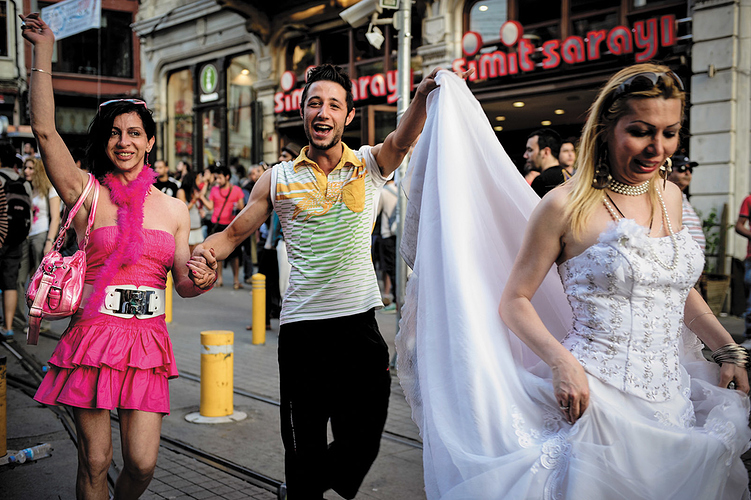In the New York Review of Books, Kaya Genç trances the history of gender nonconformity in Turkey, showing how the repressive policies of the Erdoğan government stand in stark contrast to Ottoman permissiveness around homosexuality and gender fluidity. The shift away from this permissiveness, writes Genç, coincided with “modernization” efforts in the early twentieth century, when Turkish leaders encouraged the adoption of Western binary gender norms. Read an excerpt from Genç’s piece below, or the full text here.
Ottoman law made a clear distinction between sexes, but among histories of Istanbul one also comes across references to rough men, well built and masculine, being penetrated by less virile men. Sexual orientations could alter for a few hours of pleasure, and gender fluidity was not uncommon. But in the late nineteenth century, the Westernization of Ottoman culture accelerated, and homosexuality and gender fluidity among Turkish men became a problem for modernizers. Westernization, in its nationalistic, muscular, Germanic form, filtered into Turkey through the Ottoman military, not unlike Japan’s militarist modernization. Volk in Waffen (Nation in Arms), a treatise advocating increased military involvement in public life, became popular at the Imperial Military Academy after its author, Colmar Freiherr von der Goltz, trained Ottoman officers there between 1883 and 1895. It influenced the thinking of young career soldiers, including Enver Pasha, a leader of the Young Turk revolution in 1908 that laid the foundations of the Turkish Republic. Under European influence, Turks came to believe that they were allowing degenerate, even criminal acts in their dominions, and homophobia began to take root.
The founders of modern Turkey and their modernizing leader, Mustafa Kemal Atatürk, disliked the Ottomans’ permissiveness about sexuality, which they found regressive and non-European. In New Desires, New Selves, Gul Ozyegin, an associate professor of sociology and gender at the College of William and Mary, explores the change in Turkish attitudes toward sex in the early twentieth century and quotes a Kemalist historian who described the Ottoman Empire as “governed by pleasure and perversity, a world that recognized no moral boundaries…a perverse space where the voracious and debauched sultans committed all kinds of abominable acts, including homosexuality.”
Turkish modernizers designed the Republic as a place where gender identities were strict and unambiguous: the powerful woman who devotes her life to family and the athletic man who works for the good of the nation. The editors of Gendered Identities, a collection of articles on gender and sexualities in Turkey, contend that patriarchy and sharply defined genders have shaped modern Turkey and defined its founding principles. They write that Turkey’s “gendered citizenship regime” is responsible for putting “transexuals at the bottom of the societal structure in the context of the social Darwinistic mentality.”
Image: A mock wedding of a transgender couple on Gay Pride Day, Istanbul, June 2010. Via New York Review of Books.
